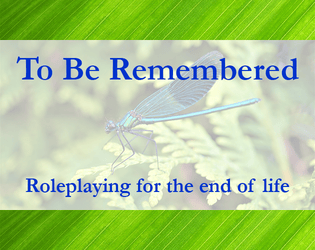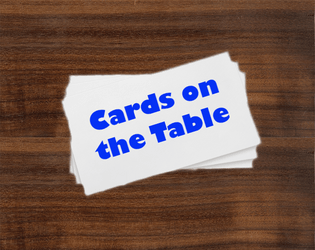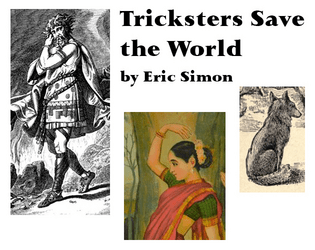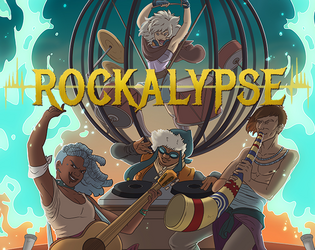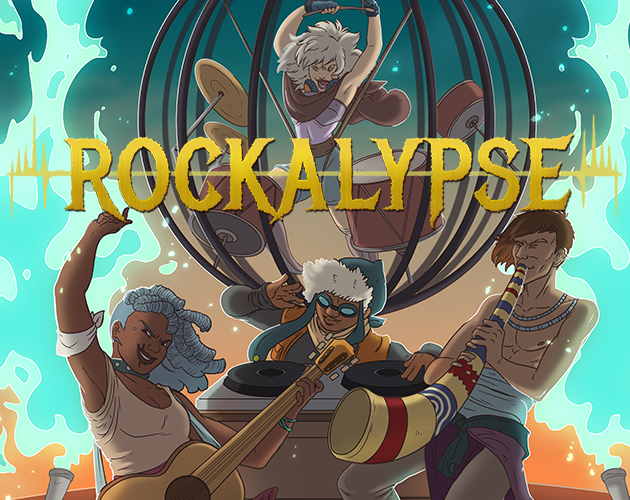I'm closing in on a game that mixes the themes and sensibilities of Bikini Kill's "Rebel Girl" with the life and work of Eleanor Marx and the other women she worked with.
Four-in-Hand Games
Creator of
Recent community posts
I am considering doing a game focusing on monarchs, so I would humbly suggest the Monarch Joint Venture, which focuses on bringing together many different monarch butterfly conservation efforts through partnerships and information sharing:
https://monarchjointventure.org/
Oo, yeah! I haven't been designing in the Belonging Outside Belonging space, but I definitely enjoy playing there. Dig it!
So based on your work with Exodus, what do you think are the political assumptions inherent in games that are focused on travel as their primary action? Your game looks like it's very much about facing external challenges. Are there internal as well? What's the balance?
Certainly! And also I'm curious how you feel about your presentation. For instance, you suggest adapting to other systems - in what ways does your setting help or hinder adaptations to specific rules sets? How does this affect audience and accessibility?
Transhumanism does indeed come with a whole slew of assumptions about the world. How are you addressing those? Do you play with identity issues a lot, or not so much?
There's quite a bit you can still dig into.
This is a thing that I am seeing referenced obliquely through several of the threads in this forum, and I thought it was time to get explicit about it. Games are inherently political, and I'd like to get both player and designer thoughts about the politics of your games and the games that you play.
I see that many of you like frameworks, so here's my framework:
(You can see the original blog post with additional comments here.)
***
In examining the political views of a game – particularly a roleplaying game – we can look at those elements that always exist in the medium: the premise, the action, and the presentation.
Premise
Whether a game provides a setting for you or expects you develop one at the table, it usually provides a premise. Unless consciously guided away from them, the premise is always built around the biases of the creators.
If there is a setting, we can quickly see the biases built in: Who are the leaders and citizens in this setting? Are there different races that are assumed to have inherent, perhaps monolithic personalities? Are there analogs to the real world, and how well do those analogs represent their real-world equivalents? Of course, if the setting is closer to the real world, then creators can’t help but reveal their social and political biases. Do they glorify or romanticize certain nations, policies, or historical eras? Do they gloss over the impact of certain events or individuals? These choices, whether conscious or unconscious, help foster the game’s particular world view.
If a game expects you to create your own setting, then it may offer guidance. Does it ask you to look at big picture effects of your choices or assume you will create an isolated framework of tropes? Setting creation guidelines almost always offer some constraints – what kinds of worlds and stories will this game NOT let you create?
Action
In nearly all roleplaying games, you generally want to do…something. The action might be physical, emotional, or conceptual, but you can expect to act, change, or grow in some way. Whether characters do the same thing repeatedly or a variety of things, those actions and their methods are another area where the game’s politics show through.
The actions themselves make assumptions about the world. Is violence common or uncommon? Is there violence against objects, institutions, creatures, or sentient beings? Are there consequences or rewards for conflict? Is conflict inevitable, or can it (always) be avoided?
In terms of methods, things like skills, moves, and attributes can say a lot about what is important to the politics of the game. Is strength favored over intellect, or vice versa? What abilities or practices does the game mechanize and what does it “leave to roleplaying?” Do the mechanics favor cooperation or individual action?
Presentation
The writing, art, and even layout might be limited by what is available to the creators, but ultimately there are still choices being made that say something about the politics of the game and its creators.
The language of a game book reveals creator assumptions about the game’s target audience. What terms and pronouns are used for the players and organizer? Is the tone formal or conversational? Does the game mention or assume player support practices or safety tools? Are there examples of play, explanations of design philosophy, or hacking tools? Does the text specifically suggest or proscribe certain play styles or activities?
Art can welcome and guide players, but it can also drive people away. Who is being represented in the game’s art, and how? Is there textual explanation for the art selections? What activities does the art depict, and does this correspond to the main activities presented in the text? Are there images that might be uncomfortable or even upsetting – is there textual explanation for those images?
Even the organization and layout of a game can say something about who it’s for. Is the text cramped and multi-column, or spread out and single column? Which chapters or sections come first, and which are given the most space? Is there indexing and/or digital bookmarking?
And the rest
There are so many other things that can tell you about the politics of the game. From broad concepts like the theme and genre down to something as focused as the maps – all of these contribute to the views that the game and creators are putting forward.
Good designers are aware of this and make these choices intentionally. But everyone makes choices whether they know it or not. When you’re reading or playing a game, try asking yourself these questions and see what message the game is giving you.
***
So what are your politics, or the politics of the games you play? If you want an example, you can see my answers for Rockalypse, the first game I've brought here to Itch, on my website as well.
Eric Simon (he/him). Most known so far for creating Steamscapes, a post-colonial alt-history steampunk setting for Savage Worlds, and Rockalypse, the Fate-powered game of post-apocalyptic musical conflict.
I'm mostly here to explore side projects and push my design envelope a bit. I'm excited to dive into some jams.
I'm personally new, and I've brought Rockalypse, the Fate-powered game of post-apocalyptic musical conflict.
It's Tank Girl meets Jem, Blade Runner meets Scott Pilgrim, and Gorillaz meets...well, the Gorillaz. (They were already playing Rockalypse even before it existed.)
As heard on One Shot
Rockalypse is now on itch.io!
https://fourinhand.itch.io/rockalypse
Rockalypse is the Fate-Powered game of post-apocalyptic musical conflict.
This 89-page download includes rules for both Fate Core and Fate Accelerated.
- 4 new skills - Melody, Harmony, Rhyme, and Rhythm - replace Fight, Provoke, and Shoot to bring musical conflict to your table
- Dozens of stunts for new and old skills, plus stunt creation advice especially for Fate Accelerated
- A unique new initiative system designed to maximize collaboration
- Plenty of play examples and guidance for new GMs and players


